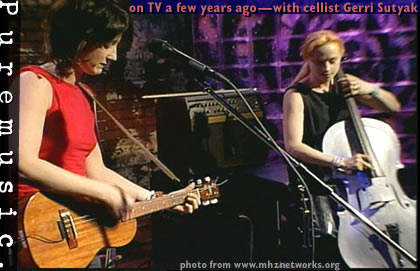
A Conversation with Amy Correia (continued)
PM: Because I got Lakeville from iTunes, I lack credits. I forget who's playing drums on that record.
AC: Oh, yeah, it's too bad iTunes doesn't have credits on there.
PM: It sucks.
AC: Gosh, and my website probably doesn't have them either. That's something I should fix. But my record, of course, has credits. Mark Howard was the producer, mixer, and engineer. And the drummers were Scott Amendola--
PM: Oh, right, from Charlie Hunter's band.
AC: Yeah. And Daryl Johnson played bass.
PM: Right.
AC: And there was also some other drummers, Dean Butterworth, who plays with Ben Harper, he played on a couple tracks.
PM: Wow.
AC: And a drummer named Sean Reinert, who's in Los Angeles, a friend of mine. And there's a band called Aeon Spoke, they're good friends of mine. They recorded about three tracks, it was like that band was my band.
PM: Is that a New York band?
AC: No, they're out in Los Angeles. Also a wonderful cellist, Gerri Sutyak. And my friend Kip Boardman played bass. And a guitar player named Josh Grange.
PM: Oh, yeah, the guy who also plays steel. Oh, he's great.
AC: He's wonderful. Yeah, I just did a show with him in Los Angeles, Josh and a bass player named Brett Simons, and Don Heffington, the drummer.
PM: Speaking of Josh Grange, there's something on that song, "Second Thought," going from the first verse to the chorus that sounds like some mysterious ascending wind. Do you know what that sound is?
AC: [laughs]
PM: What is that? A steel?
AC: [laughs] I think it might be the pedal steel, yeah. With Mark Howard, you never know. I mean, I was trying to see what he was doing, but sometimes he'd like go behind the curtain and tamper with the knobs. I don't know what he was doing! [laughs] And he works so quickly that you really don't have a lot of time to analyze what's going on. I mean, stuff just starts happening. He's got his system, and it works, and it really becomes about the performances.
PM: Wow.
AC: It's really not about the guitar player or drummer going, "Hey, I think I need a little more of this or that." It's really not. You got to really just trust him. He inspired a lot of confidence. And all the players were just like great, you know? It was a lot of fun.
PM: And he's a friend that showed up at the right time.
AC: Yeah. He's somebody that I met when I used to live out in Los Angeles. I had actually gone up to cut a few songs with him when he was in Oxnard, at the Teatro Theater. He had a studio up there with Daniel Lanois.
PM: Right.
AC: That's where they made Willie Nelson's Teatro CD for Capitol. And we did a couple of songs, but the Capitol Records people weren't ready for something quite that earthy and ethereal, I guess.
[laughter]
AC: But yeah, it didn't come to pass. But then Mark and I ran into each other, whatever it was, four years later, when I had gone out to Los Angeles and was trying to figure out how I would make my next record. And I ran into him, and he invited me to come to the Paramour and record for a couple of days. And that's when we finished half the album, really.
PM: Is that quite a joint? Does he own the Paramour?
AC: No, no. He was renting. A woman named Dana is the owner. She bought about six years ago. She bought it from nuns.
PM: Wow!
AC: It used to be a convent after it was this big estate. And then when the nuns moved out, she went in there and started renting it out, and Mark rented the ballroom as a studio.
PM: Wild.
AC: Yeah. Right now he's in Australia, I don't think he's necessarily planning on working there again. He's a gypsy, he moves around.
PM: That's beautiful.
AC: [laughs] So I'm lucky that I got to have that experience with him. And you know what else is kind of funny is that when I made my first album, the very first place I went to record, when he was actually with Virgin Records, was in New Orleans, Daniel Lanois' studio Kingsway. So it's funny, I guess I should have brushed shoulders with Mark during that period, too. Trina Shoemaker was the engineer on those sessions.
PM: Oh, right.
AC: And I remember we were talking about Mark at that time. But he wasn't there that year. So anyway, it all is kind of connected somehow.
PM: Absolutely. continue
print (pdf) listen to clips puremusic home